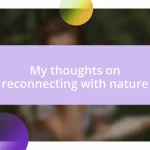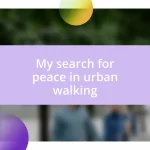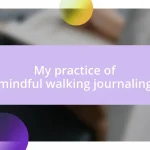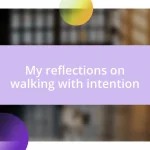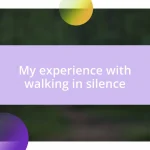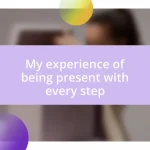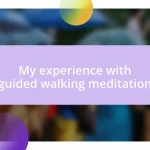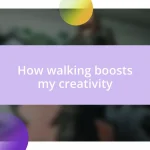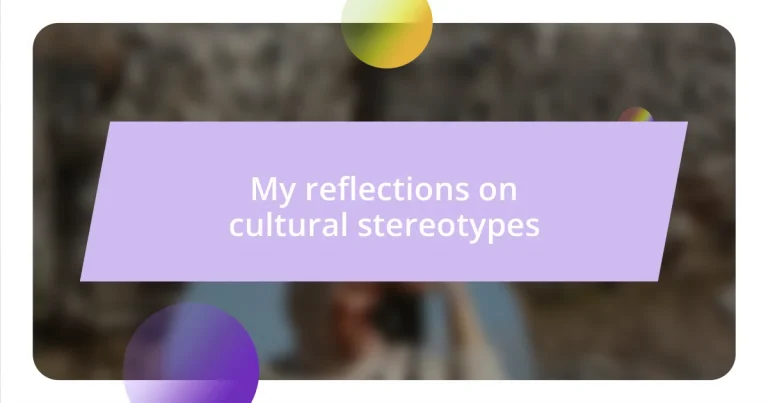Key takeaways:
- Cultural stereotypes oversimplify identities and lead to misunderstandings, limiting personal expression and genuine connections.
- Challenging stereotypes through open conversations and shared experiences can foster authentic relationships and promote cultural awareness.
- Building inclusive communities requires intentional efforts, continuous learning, and active participation in dismantling harmful assumptions about diverse identities.
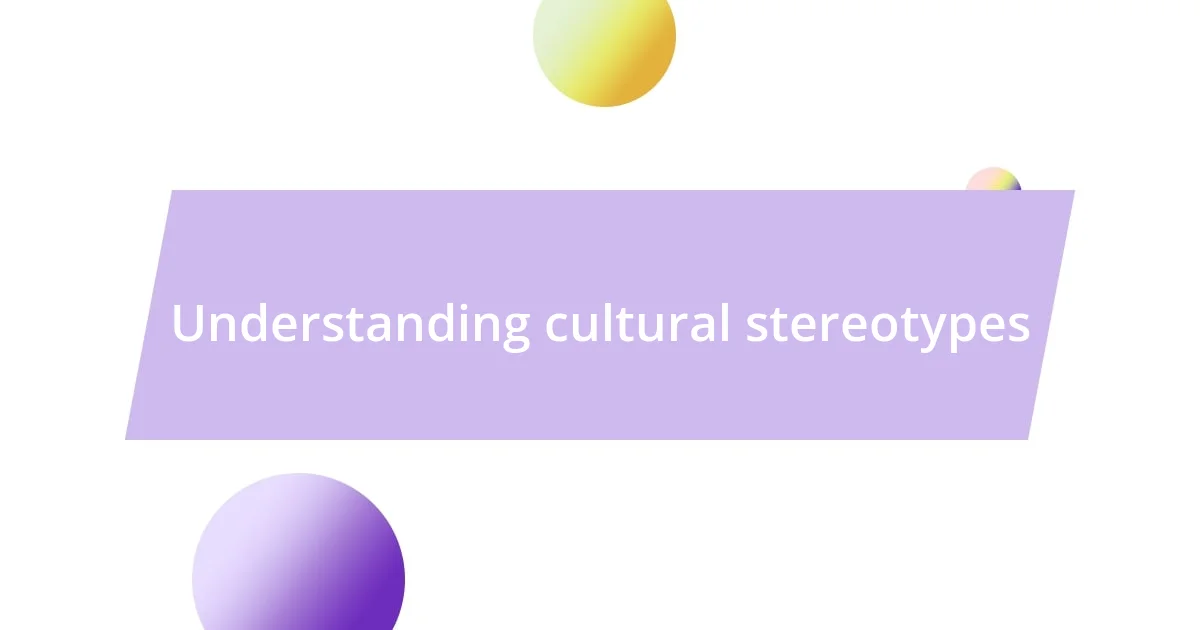
Understanding cultural stereotypes
Cultural stereotypes are simplistic and often exaggerated beliefs about groups of people, shaped by societal narratives and media portrayals. I remember a conversation with a friend from Italy who expressed annoyance at the stereotype of Italians always being loud. It made me wonder—how often do we label people based on a single trait or representation, failing to recognize the richness of their individual experiences?
When I moved to a new city, I encountered various stereotypes about Americans that puzzled me. It struck me how these generalizations could lead to misunderstandings and even conflict. It left me contemplating: if we see each other through narrow lenses, how can we truly appreciate the vibrant tapestry of cultural identities that exists around us?
I often find myself reflecting on my own biases when I hear a certain stereotype. For instance, being labeled as “the quiet Asian” seemed limiting and did not capture my love for lively discussions. It led me to realize that stereotypes rob us of genuine connections and the opportunity to see people as multifaceted individuals. How liberating would it be if we approached each interaction with a blank slate, allowing people to define themselves?
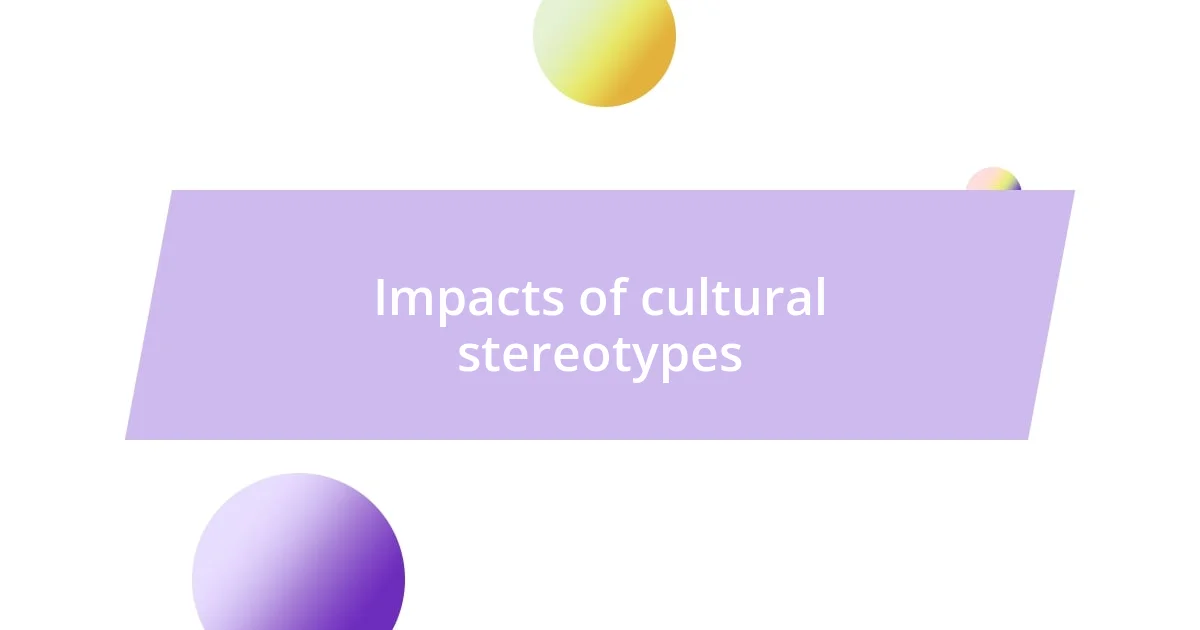
Impacts of cultural stereotypes
Cultural stereotypes can deeply impact how we perceive ourselves and others. I recall a moment when I was in college; a professor assumed I must excel in math because of my ethnic background. While it was meant as a compliment, it felt like a burden, reinforcing a stereotype that I didn’t fit. This experience pushed me to reflect on how these oversimplified beliefs can shape expectations and limit personal expression.
Additionally, I’ve seen how stereotypes can perpetuate societal divides. For instance, I once attended a multicultural event where performers were often pigeonholed into specific roles based solely on their ethnicity. This practice not only undermined their diverse talents but also reinforced a narrative that many cultures only have one story to tell. It’s disheartening to think about the creativity stifled by these narrow views.
Comparing the positive and negative impacts of cultural stereotypes reveals a complex interplay. While they can foster a sense of belonging for some, they frequently lead to misunderstanding and discrimination for others. I believe we have so much to gain by challenging these stereotypes and embracing the vastness of human experiences.
| Positive Impacts | Negative Impacts |
|---|---|
| Can create a sense of community and shared identity | Leads to misunderstanding and conflict |
| May promote cultural pride | Limits individual expression and authentic connection |
| Encourages cultural exchange | Perpetuates discrimination and inequality |
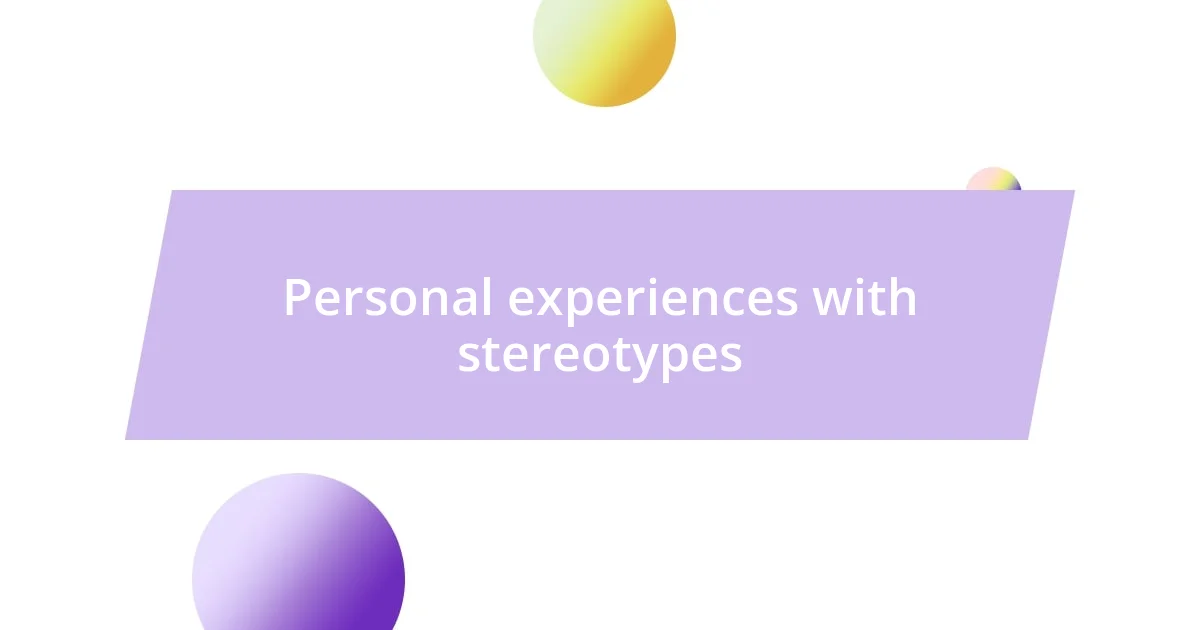
Personal experiences with stereotypes
There have been moments in my life when stereotypes became more than just fleeting assumptions—they became a part of how others perceived and interacted with me. I recall attending a networking event where, based on my background, people anticipated my expertise to align strictly with Asian culinary traditions. It felt disheartening. I wanted to share my passion for literature, not just the recipes of my culture. This experience made me confront how some stereotypes can box us into roles we don’t necessarily resonate with, leaving little room for personal passion and representation.
- A time when my skills were overlooked because of my background
- Feeling marginalized at a cultural event where only performers of my ethnicity were highlighted
- Finding it frustrating when others assume my career path based solely on stereotypes
- Realizing the complexity of my identity made some connections feel superficial
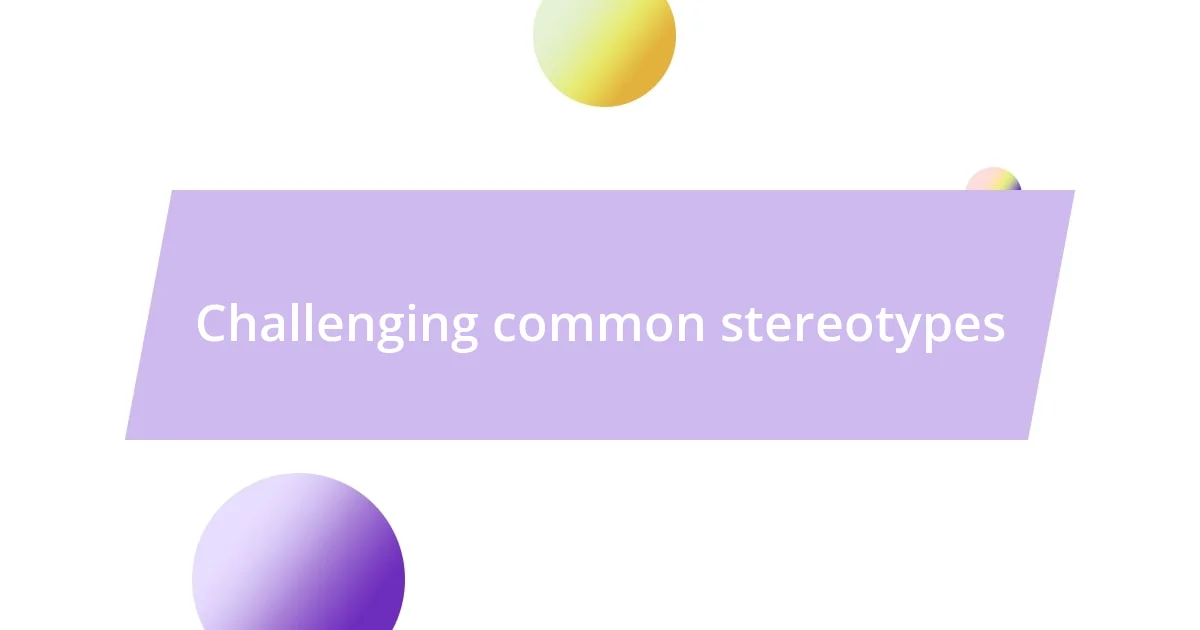
Challenging common stereotypes
Challenging stereotypes calls for us to dig deeper into our narratives and recognize the richness of our identities. I remember a time at a community gathering when someone assumed I wouldn’t be interested in sports because of my background. I surprised both of us when I shared my lifelong passion for basketball. That moment was a testament to how challenging these preconceived notions can not only enlighten others but also empower us to express our multifaceted selves.
Engaging in open conversations about stereotypes can be a powerful catalyst for change. At a recent dinner with friends, I shared an experience where I was pigeonholed into a “quiet” stereotype based on my ethnicity. To my delight, it sparked a lively discussion, allowing each of us to share how such assumptions had influenced our lives. It became clear that we all had our own stories to tell, and that breaking down these stereotypes requires not just awareness, but also willingness to listen and learn from each other’s experiences.
I find that questioning stereotypes isn’t just about proving them wrong; it’s about fostering authentic connections. One time, I volunteered at an educational workshop and pointedly discussed how cultural backgrounds shouldn’t define career aspirations. The thoughts and reflections shared by participants were illuminating; they connected over shared struggles and triumphs. It showed me that by collectively challenging stereotypes, we can create an environment where everyone feels valued and understood. Isn’t that what we all crave?
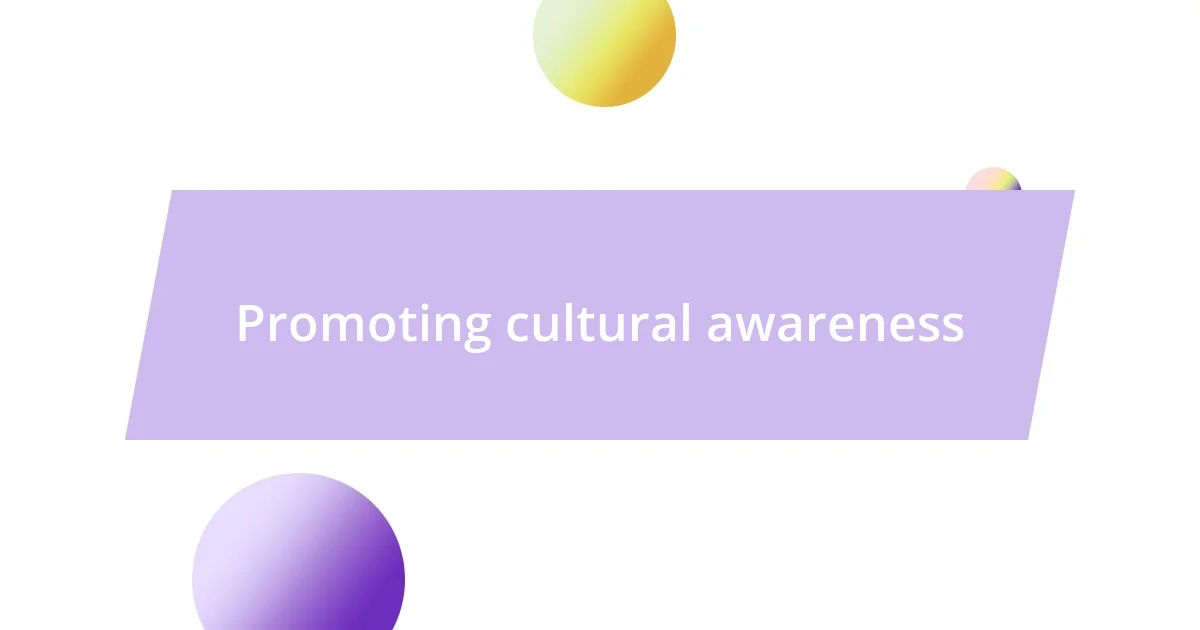
Promoting cultural awareness
Promoting cultural awareness is essential in breaking the cycle of misunderstanding that often perpetuates stereotypes. I remember attending a cultural festival where I was genuinely excited to see performances from various backgrounds. Yet, I couldn’t help but notice how many people only interacted with those who fit neatly into their perceptions of culture. It made me wonder—are we really appreciating diversity when we focus solely on the familiar?
During a conversation with a friend from a different cultural background, I felt the power of shared stories. We delved into our family traditions and the significance behind them, discovering countless similarities despite our differences. This moment illuminated the idea that when we share our narratives, we create bridges of understanding and empathy. I think we often forget that cultural awareness begins at such intimate exchanges. Have you ever experienced this kind of connection through storytelling?
I’ve also seen how educational programs can effectively promote cultural awareness. Volunteering in local schools, I observed students engaging with cultures different from their own through art and literature. The excitement in their eyes as they learned not only about the traditions but also the complexities behind them was inspiring. It reinforced my belief that learning about others encourages curiosity rather than judgment. Don’t you think fostering an environment of exploration can greatly impact how we perceive and value each other?
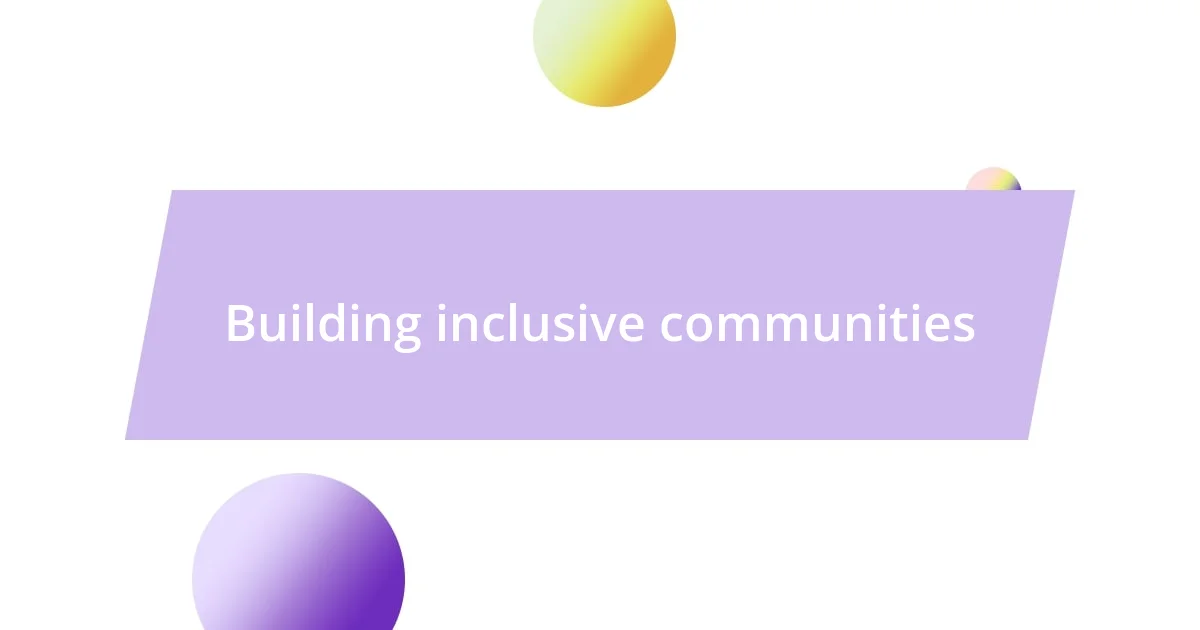
Building inclusive communities
Building inclusive communities means actively creating spaces where everyone feels a sense of belonging. I recall an experience at a local block party; it was a melting pot of cultures. Each booth represented a different tradition, and I was thrilled to see people stepping out of their comfort zones, trying unfamiliar foods and dances. It struck me how shared experiences like these could foster understanding, making it easier to appreciate our differences. Have you ever found common ground in unexpected places?
I’ve also noticed the importance of inclusive leadership in community-building efforts. Once, I facilitated a meeting aimed at planning a community art project, where participants from various backgrounds shared their visions. The energy in the room was electric! When everyone felt heard and valued, even the quietest voices contributed meaningful insights. This made me realize that fostering inclusivity doesn’t just happen; it’s cultivated through intentional efforts and supportive environments. How do you think your community can invite more voices to the table?
Moreover, I believe that inclusive communities thrive on continuous learning and adaptation. Reflecting on my time volunteering at a community center, I witnessed firsthand how cultural workshops could spark genuine interest. One session focused on traditional crafts from various cultures, which not only brought diversity to the forefront but also encouraged participants to learn from each other. It made me ponder—how can we incorporate these experiences into our daily lives to pave the way for inclusivity? The more we engage with one another, the richer our communities become.
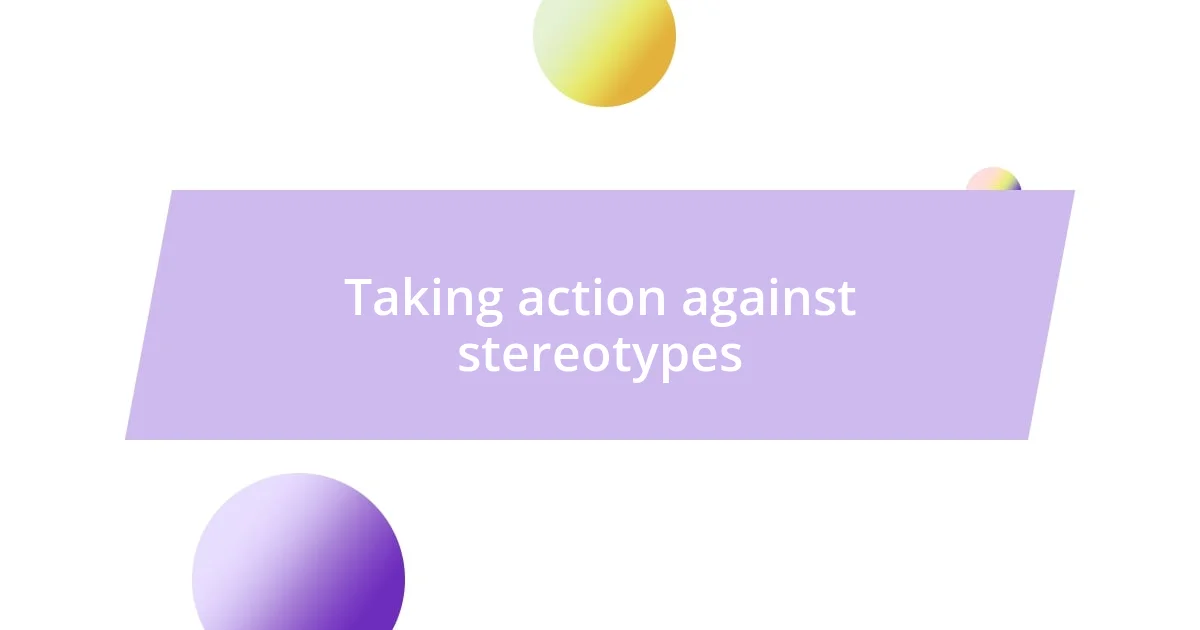
Taking action against stereotypes
Taking action against stereotypes requires more than just awareness; it demands intentional steps to dismantle harmful assumptions. I remember a workshop I attended that focused on confronting biases. It was eye-opening to see how our unconscious perceptions shape our interactions and decisions. Have you ever realized an implicit bias you didn’t know you had? This experience taught me that acknowledging our biases is the first leap toward taking action.
Another powerful moment for me occurred during a discussion panel on cultural representation in media. I was struck by a filmmaker who shared her journey of challenging stereotypes in her films. Hearing her passion made me reflect on the stories we consume daily and how they can either reinforce or shatter biases. It solidified my belief that supporting diverse voices in creative spaces is crucial. How often do we invest in stories that broaden our perspectives rather than limit them?
Finally, I believe community activism can be a potent remedy against stereotypes. While volunteering at a local advocacy group, I saw firsthand how organized efforts to promote cultural dialogues led to powerful change. Community murals began to spring up, each telling a unique story that challenged perceptions. It made me think—what role do we all play in telling our own stories? In that space, I realized we are not just bystanders; we are integral to shaping the narrative. Together, let’s be the change we want to see by actively promoting understanding within our communities.
